Social media has become the playground of marketing, and rarely do industries not use these platforms for their marketing activities. So, it’s not surprising that real estate social media marketing has become a discernible trend for branding and marketing, whether it be a firm or an individual agent.
There are 4.9 billion social media users globally. And a total of 41% of first-time home buyers tend to go online to look for property on sale. One can imagine the imperative of having an online presence for real estate businesses, and social media is an ideal place to capture referral traffic.
But that’s not the only reason to do it.
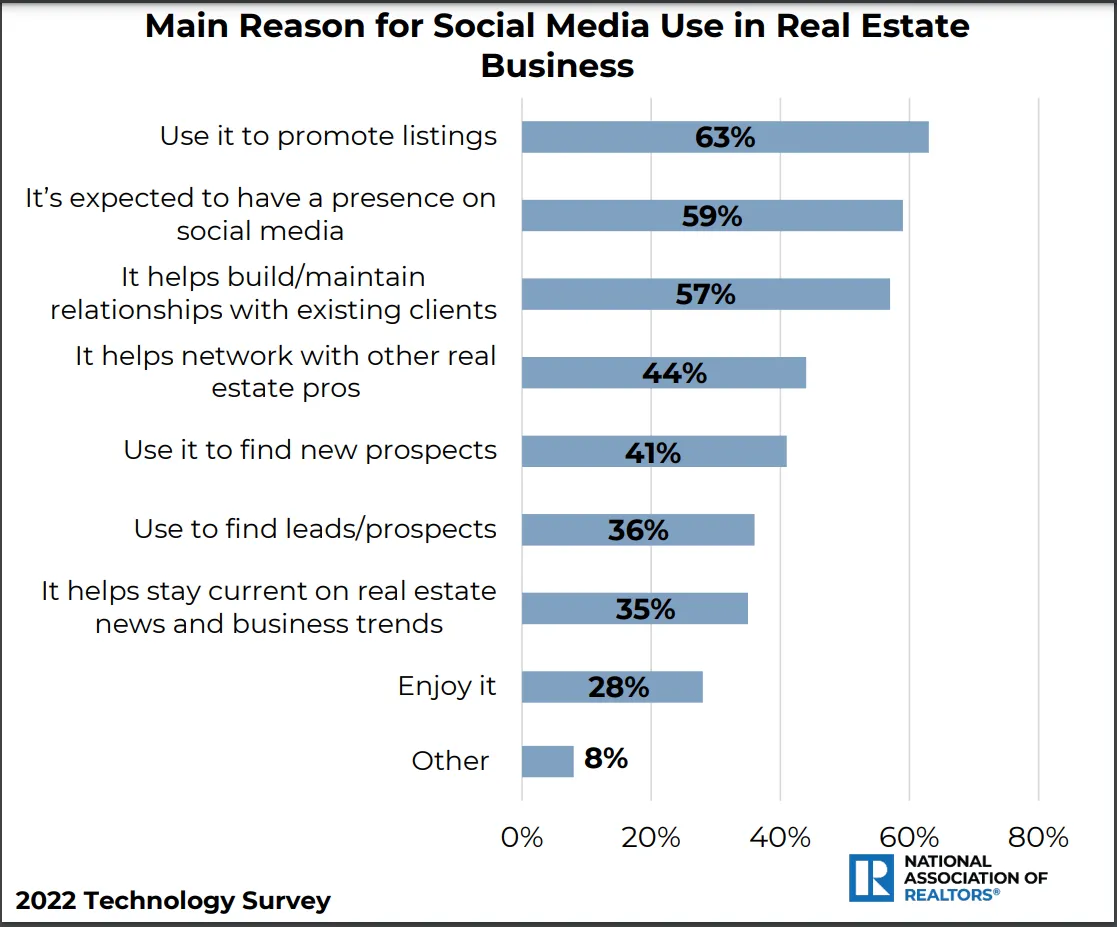
Although the main reason is to promote listings, real estate pros enjoy their social media just like anyone else. But to boost your real estate social media marketing, you must use all the social media platforms in your real estate marketing plan.
Now, don’t misunderstand.
We’re not saying you need to be on every platform. Filtering out the right ones to use is something only you can do. So, let’s begin by shedding some light on the best social media networks for real estate.
7 Best Social Media Networks for Real Estate
Having a social media strategy chalked out is vital before going forward with marketing on the platforms. Reports have shown that social media brings the highest number of qualified leads.
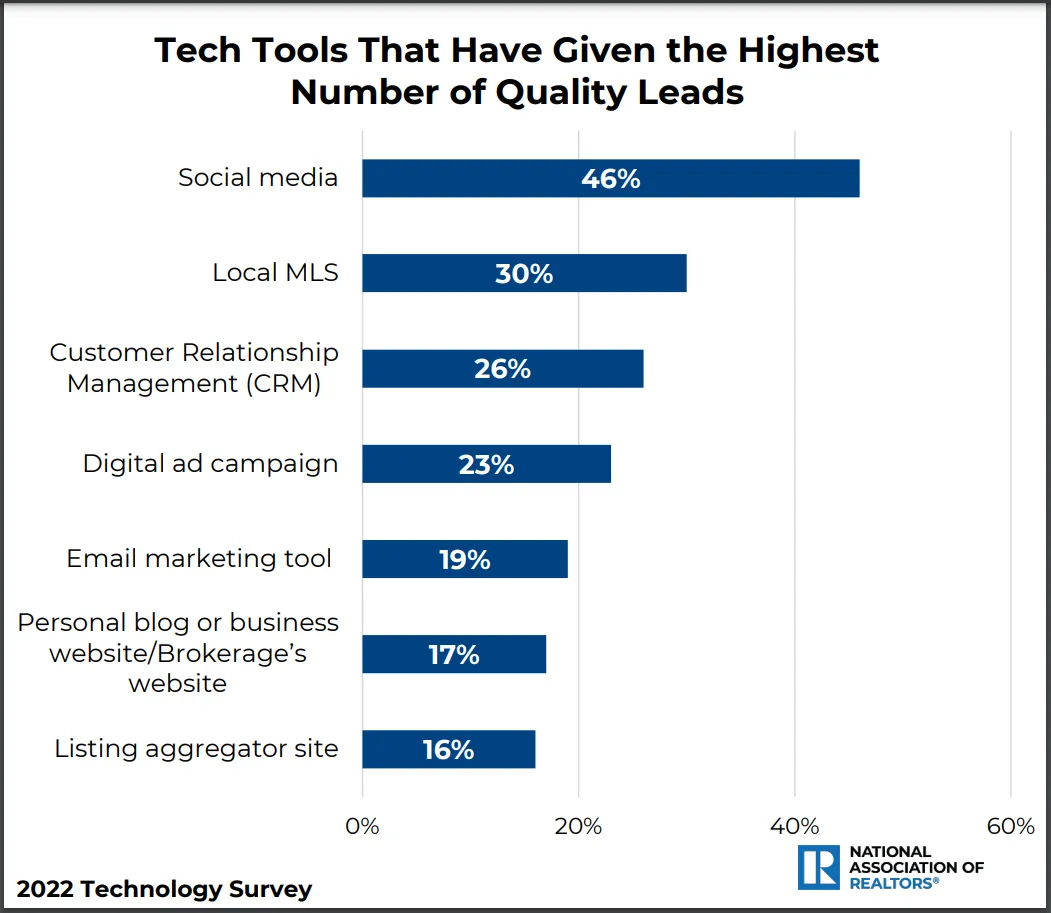
Hence, you must integrate every relevant network into your plan according to your business goals. These are all the major social media networks the professionals are using and their potential for real estate social media marketing.
1. Facebook for Real Estate Social Media Marketing
Regardless of size, Facebook is a staple network for marketing your business or brand. It lets you extend your reach to a massive audience as it boasts the largest user base among all social networks.
Despite not having the utterly professional environment of LinkedIn or the aesthetic prowess of Instagram, Facebook still proves to be quite capable as a real estate social network.
The USP of marketing on Facebook lies in its array of marketing-friendly features, like audience targeting, Facebook ads, boost posting, CTA elements in posts, etc. While advertising on it, marketers can fine-tune their content reach based on age groups, professions, locations, and more. The journey doesn’t end here. Facebook’s Ads Manager lets you keep a tab on your marketing, optimizing your real estate social media campaigns.
All these features make Facebook the first platform for starting a real estate social network.
2. Instagram for Real Estate Social Media Marketing
You might consider skipping Instagram due to its reputation as a platform for younger demographics.
But here is a surprising fact.
According to the National Association of Realtors (NAR) home buyers and sellers generational trend reports for 2022, younger millennials (18-24 years) constitute 18% of the total home buyers. Also, 81% of them were first-time home buyers, more than the other age groups.
Instagram now functions in tandem with Facebook, so you can run many social campaigns on both platforms together from Meta Business suit. So, why not leverage a platform which allows a series of images in combination with videos to post all your listings?
Also, Instagram Stories can provide people with tidbits of information regularly to increase engagement.
3. LinkedIn for Real Estate Social Media Marketing
As mentioned earlier, LinkedIn is an ideal platform for connecting with real estate professionals. While it might not be ideal for reaching out to individual home buyers, it’s a prime spot to meet people with commercial real estate needs.
This network is a powerhouse for establishing thought leadership, building solid professional connections, and promoting your brand among your peers. Furthermore, you can connect with other real estate agents, exchange leads, and share listings with those interested. This is a very nifty way of building great connections across the industry.
But why stop at real estate professionals when you can do more?
Broaden your network to include home inspectors and mortgage brokers, as their expertise might prove invaluable in tricky situations. Adding packers and movers to your contacts could provide an added bonus for your clients, further enhancing your service offerings.
4. Twitter for Real Estate Social Media Marketing
Want to be heard by a relevant audience?
Twitter might be a great platform to promote your real estate business. However, Twitter may not fit the bill to cultivate long-standing connections.
If you are using Twitter for real estate social media marketing, establish yourself as a thought leader by sharing expert insights and trends. Participate in relevant conversations or keep a keen eye on posts that could potentially turn into leads.
Other than this, Twitter lists can be your one-stop shop to keep tabs on all your competitors in one place.
5. YouTube for Real Estate Social Media Marketing
Are you maximizing the potential of video content in your real estate marketing strategy?
Videos are the most consumed content format, be it short-form or long-form. And 73% of homeowners prefer agents who use videos. This fact directly correlates to the finding that real estate listings with at least one video get 400% more inquiries.
That is why YouTube, as a real estate social network with more than 2.6 billion active users, shines as a top choice for your social media marketing.
Consider diversifying your content by creating both standard videos and YouTube Shorts. Shorts are especially popular due to their ‘snackable’ nature, and the audience enjoys scrolling through them. Remember to use video editing tools that can optimize your content, making it both engaging and professional.
When it comes to YouTube, don’t overlook the importance of accurately titled and described videos. Including the right keywords and tags can greatly boost your video’s visibility in search results. And feel free to experiment – educational content, buyer’s journey videos, new listing showcases – all are welcome here!
6. TikTok for Real Estate Social Media Marketing
In the past, when people thought of TikTok, they assumed content that was pure entertainment and fluff. But the scenario has changed in the past two years. Now, professionals from various industries, along with famous influencers and creators, have jumped onto the space to make it into an environment beneficial for marketing.
However, with a user base leaning towards the younger demographic, how can real estate benefit from TikTok marketing-wise?
The key lies in sharing valuable information for buyers and sellers, or even real estate tips for fellow realtors, all wrapped up in TikTok’s signature creative, quirky clips.
That said, it’s worth noting that TikTok cannot be the sole focus of your real estate social media marketing strategy. It has to be a part of a larger marketing strategy.
7. Pinterest for Real Estate Social Media Marketing
Though perhaps not as popular as some other social media platforms, Pinterest is a visual powerhouse teeming with potential for real estate marketing.
Pinterest is a favorite among designers as its full of aesthetic inspiration that can be compiled and categorized into boards. And pins on Pinterest have a description and link to the website the image is from.
So, how do you to advantage of this platform?
Create boards dedicated to your business, displaying your listings. The more people pin your content, the greater reach it will have. Also, remember interaction is key on Pinterest. Pinning content from others that align with your interests is a good practice.
That was our brief rundown of how various platforms can serve your real estate social media marketing needs, and to what extent. Choose wisely and align your platform choice with your target audience and marketing goals.
Now, it’s time to roll up your sleeves and get down to business!
The next step is constructing a comprehensive roadmap for your real estate marketing plan. Stay with us as we guide you through each meticulous step of this process.
Real Estate Social Media Marketing Strategies
Ready to delve into the heart of the matter? What should you do and what steps should you take?
We’re diving headfirst into the realm of social media marketing strategies, and this is where the magic happens! Whether you’re a seasoned pro or just dipping your toes into the digital world, we have some game-changing tactics up our sleeves.
So, buckle up and get ready to unleash the power of the network to level your business up!
1. Understand the Demographics to Target
First and foremost, it’s vital to determine your target audience and conduct thorough research into demographics. In the real estate sector, the stakes are high, as this isn’t about selling products people buy on a whim. Real estate is a lifetime investment, so you need to be as certain as your buyers.
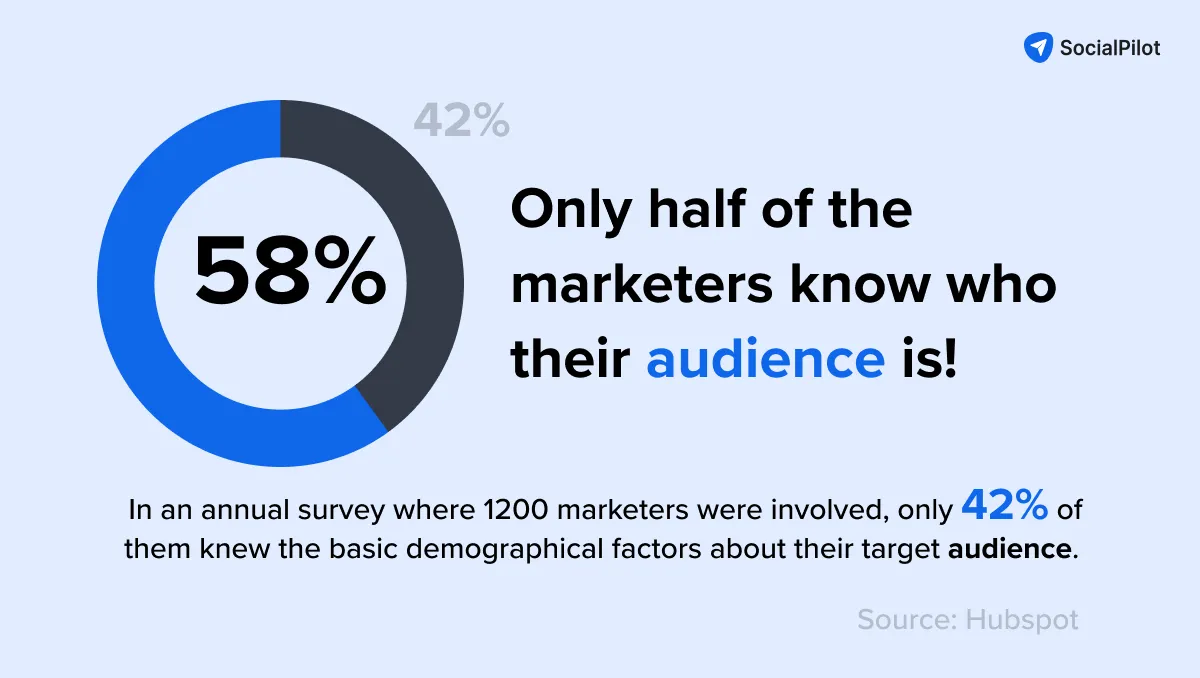
Fresh research is crucial to identify potential customers for a particular property, but certain bases must always be covered. Start by defining the demographics such as age, gender, income, educational qualification, and location.
Then delve into the psychographic elements, which can’t be easily generalized. For example, young adults buying a home might prioritize commute methods, proximity to restaurants, and a vibrant downtown nightlife. Conversely, families with children tend to prefer safer neighborhoods with community amenities, parks, hospitals, and good schools.
Understanding these contrasting needs is key to tailoring your real estate marketing approach effectively. Also, don’t forget whichever demographic your potential buyers fall into, and ensure you document their choice of social media platforms, which will be extremely helpful in the future.
When compiled together, all of these bits and pieces make up the complete buyer persona. But this needs to be tweaked for every property you try to market. Now that you have your target figured out, it’s time to focus a little on whom to watch out for.
Shall we?
2. Identify Competitors and Their Social Media Strategies
We all know how the saying goes, “Keep your friends close and enemies closer.” but how could this be effective in marketing?
After identifying who you would most likely be selling to, your next step should be to find out who else is selling to the same crowd. These will be your competitors.
Perusing the neighborhood of social media is very important to pinpoint whom you are up against. By analyzing the online landscape and observing your competitors, you can gain valuable insights into market trends, ideas on positioning your offerings, and areas where you can stand out.
It’s all about gaining a competitive edge and ensuring your real estate marketing efforts are a hit rather than a miss.
Fact: According to the National Association of Realtors data, more than 90% of real estate agents promote their listings on Facebook.
Finding your competitors is fairly straightforward, as it’s mostly a word-of-mouth game. However, although things are competitive with social media, there are tricks to simplify things.
- Start by searching with specific keywords and hashtags or names of locations. You can easily trace their footsteps since their content and tags will be very similar to what you use.
- Take note of important social media KPIs such as their follower counts, engagement metrics, and the type of content they share. Keep an eye on the responses they receive, as they could be potential leads.
- Communities can be great spaces to discover your competitors and the latest going-ons in the industry. Join Facebook and LinkedIn groups that are purely real estate-centered to discover their participants and see if they are potential competitors to you.
- Leveraging social media listening tools can make monitoring your peers even easier. They provide valuable insights into your competitors’ online presence and can even help keep an eye on your own online image.
Discovering your competition keeps you informed and helps you draw inspiration and avoid the mistakes they might be making. That is how you could steal the show from the rest of them.
After you have identified your buyer personas and compiled a list of your competitors along with their online activity, it’s time to make an important choice.
3. Select the Social Media Platforms to Focus On
Intelligent marketers understand the value of focused effort. Stretching resources across all possible avenues is not a prudent move. This holds true for social media marketing as well.
At this point, you clearly understand your target audience and your competitors. So it’s time to collate this information and decide which social media platforms deserve your primary focus. Promoting a real estate business on social media doesn’t necessitate investing resources in every platform.
With your research well in hand, you should know where your target audience resides online – this is your key consideration.
Subsequently, evaluate the platform’s features and capabilities. Do they support the type of content you want to share, such as visuals, videos, or long-form posts? What can you learn from your competitors’ choice of networks?
For additional insight, let’s look at the platforms other real estate professionals gravitate towards.
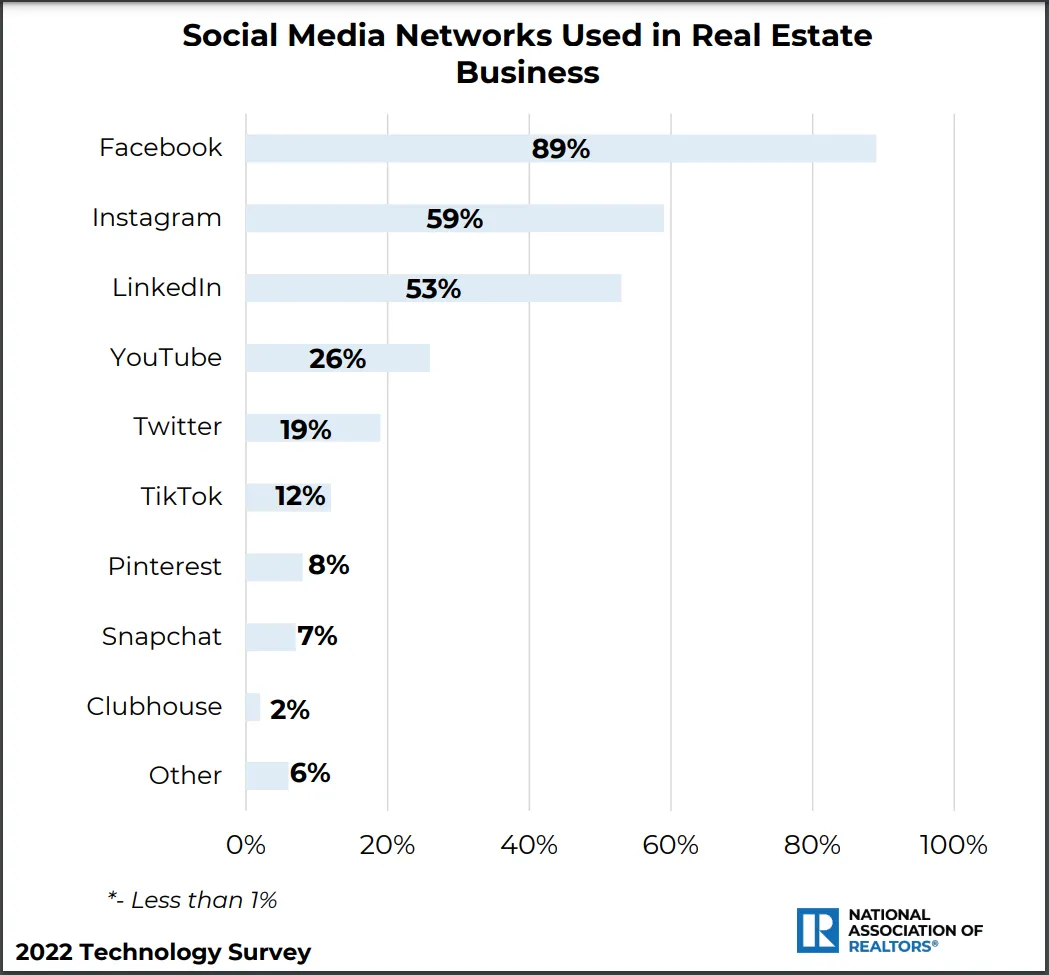
Also, don’t forget to assess the platform’s advertising options, targeting capabilities, and analytics tools to optimize your campaigns effectively. Lastly, keep an eye on emerging trends and the platform’s potential for growth to stay ahead of the curve.
Selecting the networks for real estate social media marketing is just touching base. The next step – establishing a posting schedule – is a vital part of content strategy.
4. Establish a Posting Schedule
Yes, social media revolves around content, but there’s a careful framework involved in planning the timing and composition of your posts. Whether you lean more toward aesthetic listings, industry facts, and figures, hop on the meme wagon, or create many short-form videos.
But wait…
If you’re new to real estate social media marketing, understand this – consistency is key. This applies whether your aim is building brand awareness, engaging your audience, or staying at the forefront of a competitive real estate market.
But consistency can’t be maintained on the fly; you have to have a plan to keep up the pace.
Create a social media posting schedule, taking into account the social media platforms you aim for, the best time to post on them, and the times your target audience is the most active and engages with content.
Here’s a nifty trick to streamline your content planning for real estate marketing. Use a calendar template or tools to put your plan in place. These handy tools help you visualize your posting schedule, letting you see the bigger picture. Divide each day into ideal time slots, specifying the platforms to post on each day of the week.
Being as detailed as deciding the type of post to share on specific days can really solidify the foundation of your real estate marketing strategies.
So, ready those calendars, and make your real estate social media presence shine like never before!
Once you have the structure finalized, go ahead and start your creating your content.
5. Real Estate Social Media Posts
The quality and diversity of your posts can make your content stand out amidst the digital crowd across all networks.
If you craft your content to be engaging while keeping it versatile, you won’t just capture the attention of potential buyers and sellers, but also establish yourself as a trusted authority in the real estate world.
While keeping things interesting, you also need to remember that you are making the most of your content to fulfill a myriad of objectives, which include:
- Promoting properties
- Creating brand awareness
- Engagement with the community
- Educating the target audience
- Building trust
- Drawing referral traffic
- Collecting leads
- Networking and partnerships with other businesses
To achieve multiple objectives, it’s not realistic to rely on the same type of posts. Therefore, it’s important to balance promotional and non-promotional content.
Here are some effective real estate social media posts you can use in your content strategy.
a. Offer Tips for First-Time Homebuyers
Per the NAR report, 63% of homebuyers relied on their real estate agents to help them navigate the buying process. This highlights a significant challenge for first-time buyers – a lack of sufficient knowledge about the process, especially considering it could be one of the largest investments they ever make.
You can address this need by creating content loaded with tips that can guide them towards making informed decisions throughout the purchasing process. These can be in any format, which varies from platform to platform.
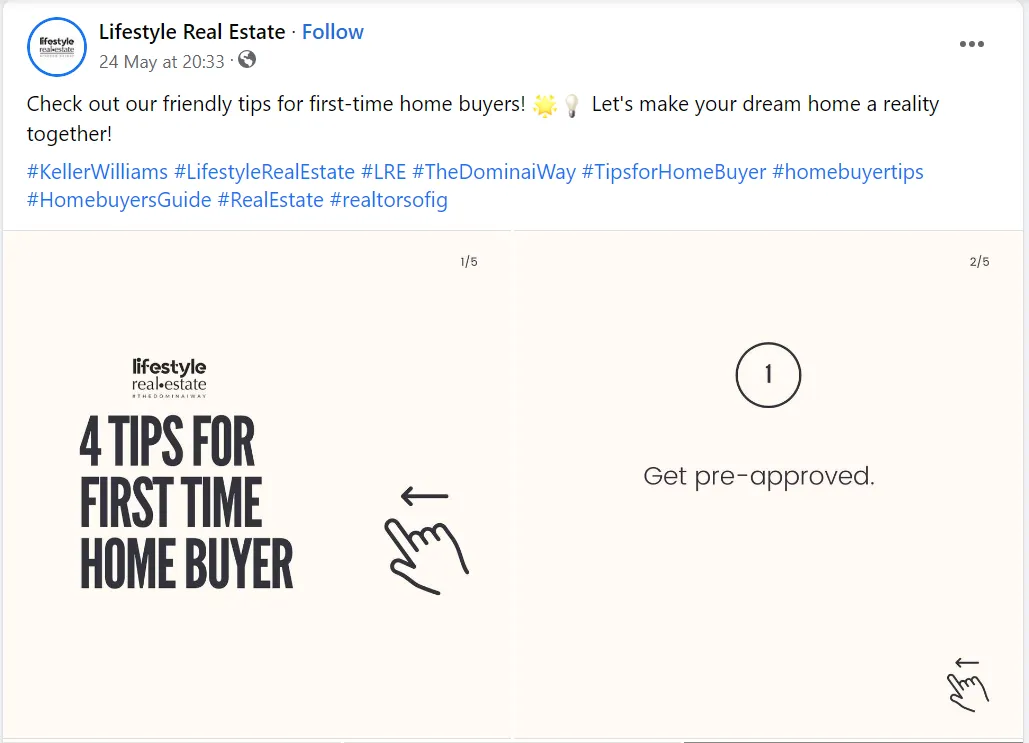
b. Create Virtual Tours Through Short-Form Videos
Video posts almost always capture the audience’s attention better than any other kind of content. This fact is particularly pertinent for real estate social media marketing, with its value extending beyond the mere aesthetic appeal to tangible benefits for potential customers.
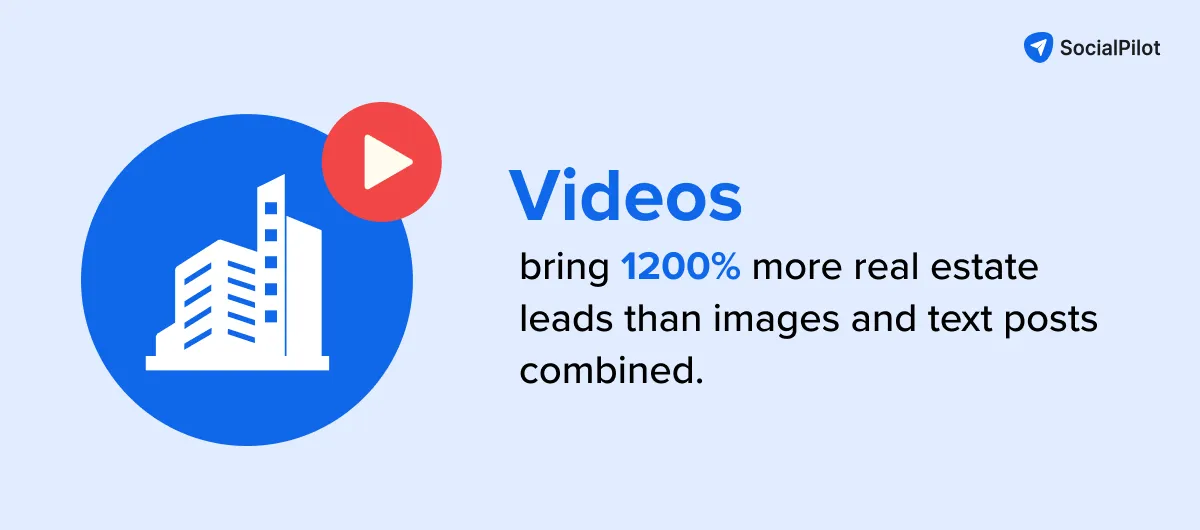
These dynamic posts provide an immersive experience that static images can’t compete with, giving viewers a sense of space and layout that photos might not fully convey. In effect, they transport potential buyers right inside the property, offering them a virtual tour that might kindle their interest and spur further action.
Also, it makes things easier for people who live far away and can’t come to see the property, saving everyone’s time and effort.
c. Updates About Open-House Events
Open houses are a common event in the real estate industry and a good way to get potential offers for the property. But if the right people don’t know about these showings, how would they show up?
This is where social media steps in to disseminate the news.
Promoting open house events on social platforms frequented by your target audience could generate a lot of buzz. Look at this post on Facebook, which has even incorporated a CTA where people can message the realtor and get an alert about the open house.
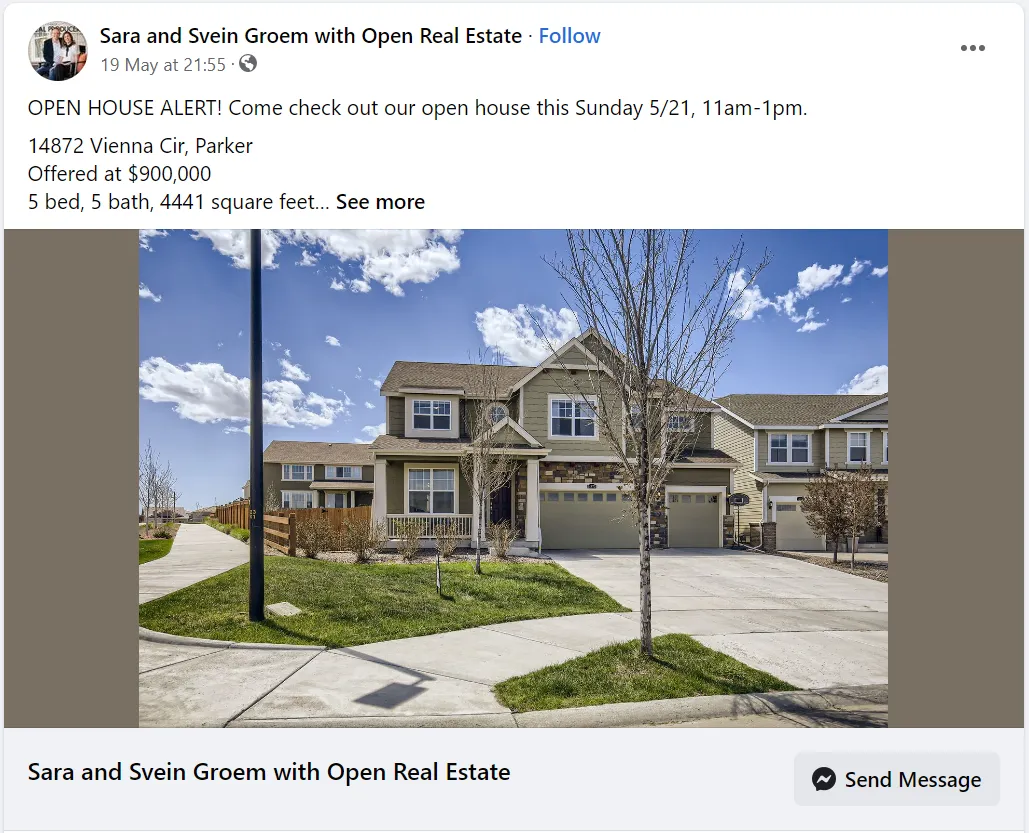
Pairing these announcements with well-curated hashtags can ensure your post reaches interested local parties inclined to visit your open house.
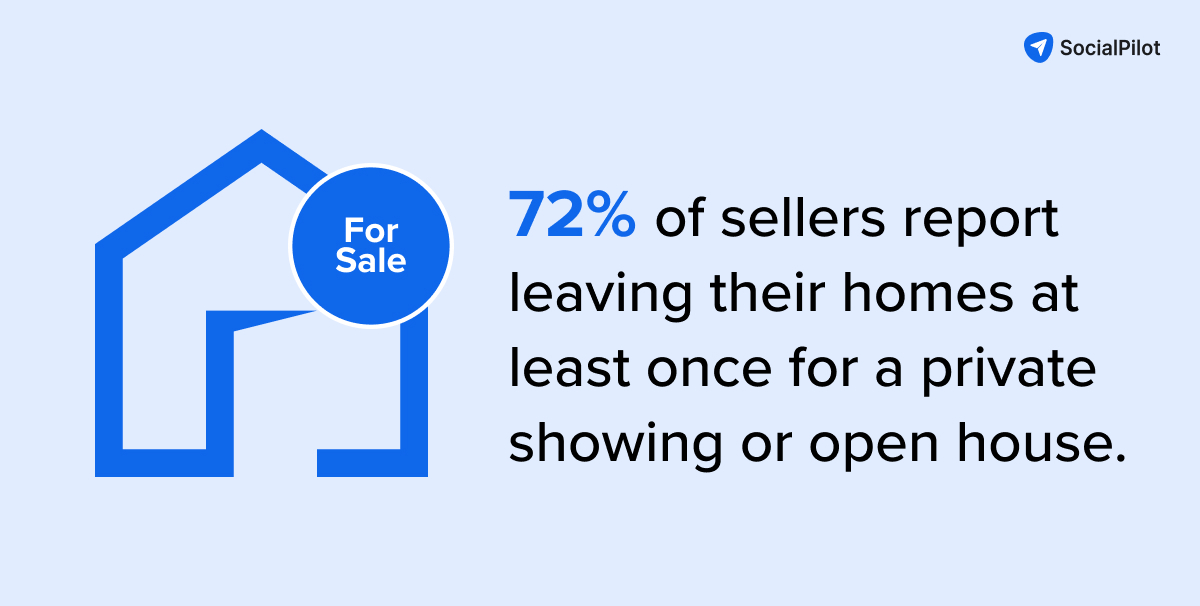
d. Showcase Success Stories With Client Testimonials
A client with whom you have a good rapport can serve as a golden ticket to your marketing efforts. They hold the potential to boost your sales faster than you could say “SOLD!”
NAR reports in their buyers’ demographic report that 89% of buyers would use their agent again or recommend their agent to others. This shows that word-of-mouth marketing, especially positive client testimonials, remains a potent force in the real estate industry.
However, positive testimonials are not easily earned. They require you to meet and exceed client expectations, providing them with a seamless experience and catering to their exact needs. But remember, the client’s journey doesn’t end with the sales transaction.
We say go the extra mile.
Maintain regular communication with your clients post-sales, checking in on their satisfaction with the property and addressing any concerns they might have.
Here’s an example of a very happy client for whom the realtor has created a great experience.
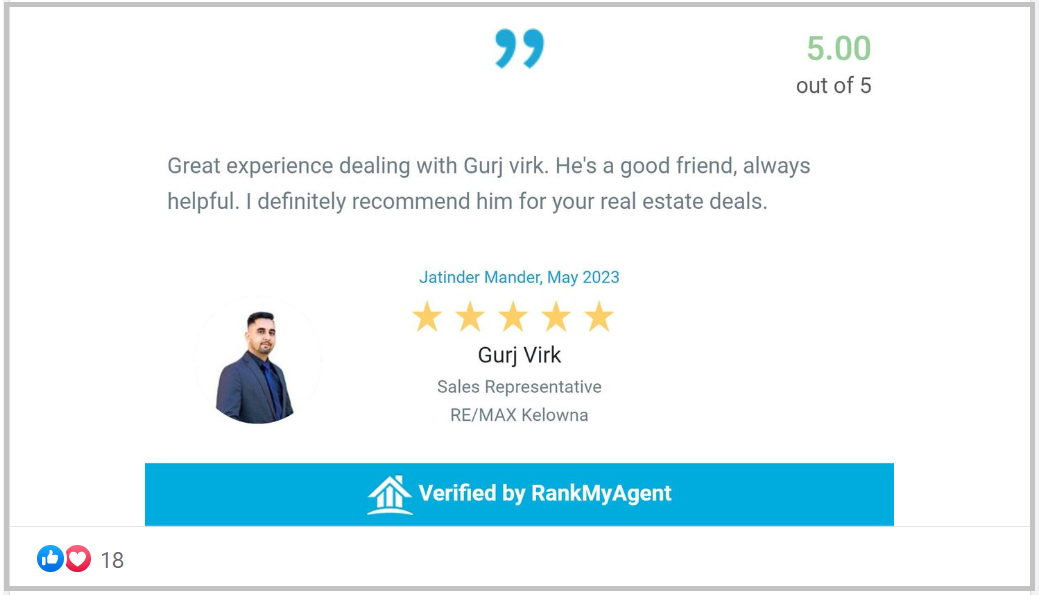
Moreover, there are various platforms where clients can independently share their feedback, like Google My Business and Facebook reviews, or they might even leave a comment or direct message you. Acknowledging their efforts promptly and engaging with their feedback is crucial, further solidifying your image as a responsive and customer-centric real estate business.
Smart business owners get the importance of acknowledging every feedback from their clients on social media. But one could easily miss out amidst the pandemonium of activities.
What if you could fit it all in one box?
SocialPilot’s Social Inbox is perfect for you. An integrated dashboard to host all your conversations on all social profiles. Just select the account and see all their reviews, comments, and messages and react to them in one go.
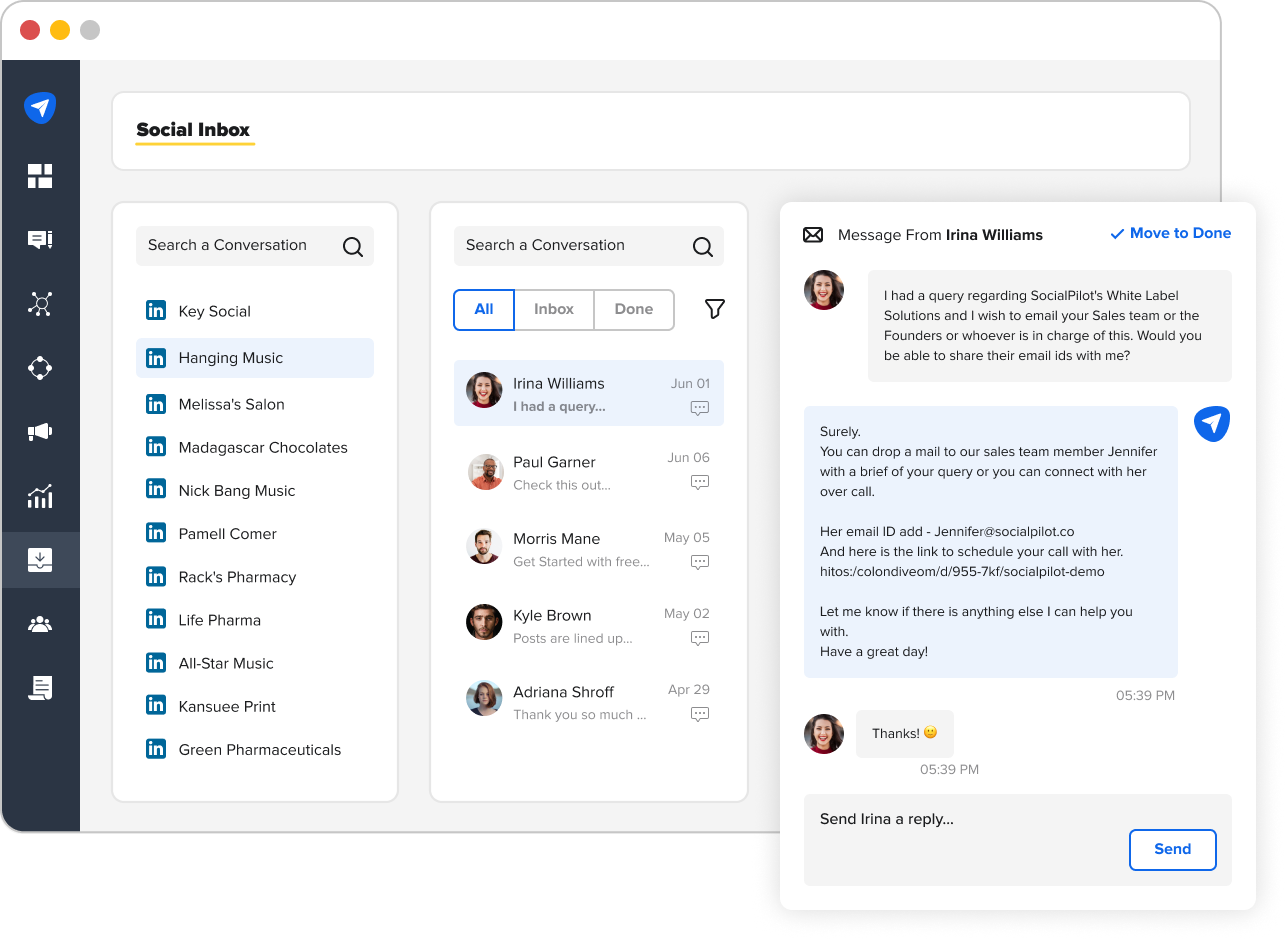
e. Tips on Interior Decor and Home Renovation
Everyone knows real estate and home decor go hand in hand. The transition from property acquisition to personalizing that space is a natural progression. So, if the element of interior design can be incorporated into real estate social media posts, these can become the beacon for engagement for you.
The realm of interior design reveals the more intriguing side of real estate. A perfect fusion of visual appeal and curiosity pulls in viewers, enticing them with the lure of stylish and unique spaces.

Furthermore, the strategic collaboration between realtors and interior designers can effectively showcase a property’s potential. Not only can such partnerships increase exposure, but they can also attract potential clients, creating a symbiotic relationship that’s beneficial for all parties involved.
In short, it’s a partnership made in design heaven!
How about posting stunning before-and-after transformations along with some this-or-that posts? Showcasing trendy decor styles or providing quick tips on sprucing up different spaces can also work.
f. Insights About the Real Estate Agents
In the world of real estate, the story doesn’t end with properties—it extends to the people behind them! Sharing insights about the real estate agent behind the scenes can work wonders in making you more approachable and relatable.
By revealing the person behind the realtor, you establish a genuine connection with your audience that goes beyond just business. It’s like having a cup of coffee and a friendly chat, but on social media!
Don’t hesitate to reveal the real person beneath the professional facade. Share intriguing details about your day-to-day life, and dare to tread beyond the confines of work.
These were just some possible ideas around real estate social media marketing. You can put your own twist to these ideas or experiment with something entirely different.
Now let’s continue with the strategies because we’re not done yet.
6. Use Customizable Real Estate Post Templates
Coming up with social media post ideas is one thing, but continuously creating a steady flow of aesthetic posts can tire out even the most proficient of designers.
Imagine if you could create a branded post of any kind in a jiffy.
It’s possible to do this with the help of customizable social media post templates.
And we think you would be glad to hear that we have created a repository of professional-looking real estate social media post templates. They can be customized on Canva and absolutely free for you to download, no strings attached.
Our collection involves all kinds of pre-made formats suitable for real estate posts for social media, be it new listings, just-sold announcements, or client testimonials. You’ll find it all in one place.
Download them all and start creating in a flash.
Free Social Media Templates for Real Estate
Easily create posts to promote property listings, new sales, open houses and more.
7. Promote the Location
Novice sellers often fixate on the property itself when trying to sell. However, seasoned real estate agents would know that to sell a property, you must first market the neighborhood.
Building appeal for an area automatically leads to piquing potential buyers’ interests. If you aim to generate leads for multiple properties in a single locale, you must show off what a great locality it is to live in.
While every home buyer has unique preferences, families seeking to settle often prioritize certain basic amenities.
So, why not highlight the…
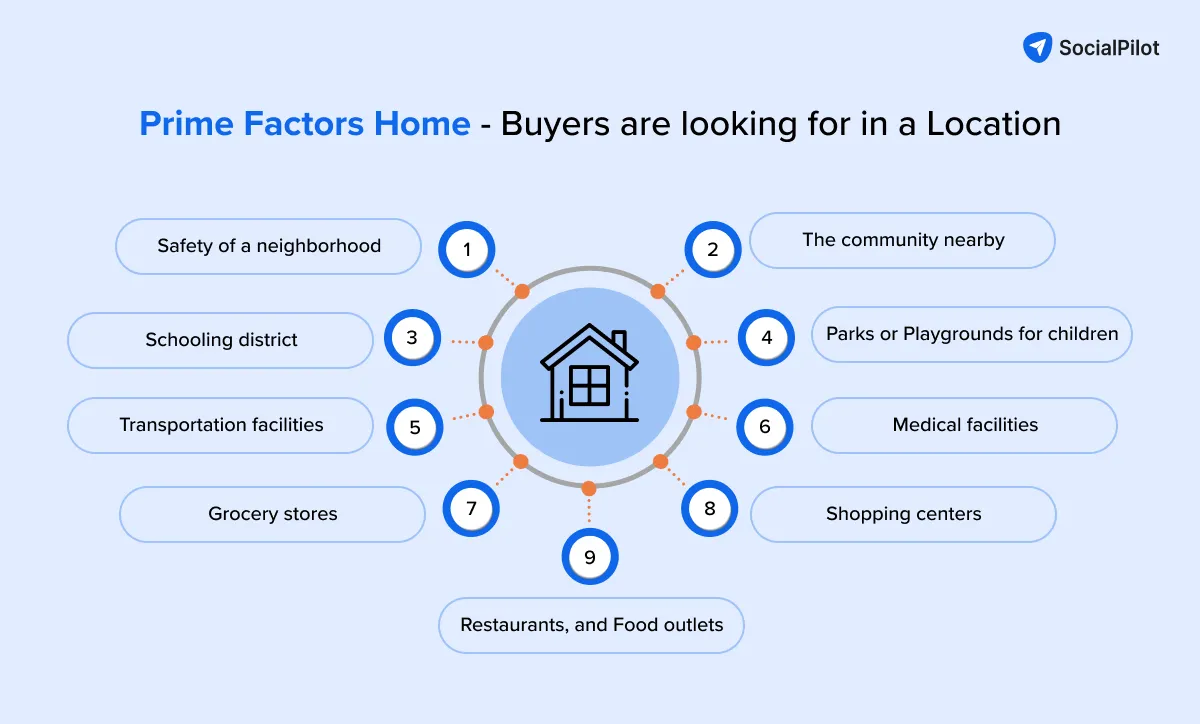
Now, you can leverage these neighborhood features to create a demand for nearby properties nearby. Following this, you can seamlessly cater to this demand with your listings.
Are you wondering about creating posts to captivate your audience with the allure of the location?
Why not consider featuring local events, sharing fascinating historical tidbits, or highlighting the vibrant culinary scene? You can also showcase breathtaking scenic views, offer insider tips on the best spots for leisure and recreation, or provide insights into the community’s vibrant culture.
Social Media Tip: Don’t neglect the power of location tagging in your real estate social media marketing posts. Twitter and Instagram allow you to add location tags to your posts directly. Facebook offers audience targeting, where you can concentrate on specific locations.
The goal is to craft a compelling narrative with potential buyers falling for the property and its surroundings.
So far, our strategies have focused mainly on content and posting consistency. But what about the searchability of your content?
We have insights on this topic as well.
8. Leverage Hashtags for Enhanced Searchability
Though seemingly small, hashtags carry a significant impact, especially for businesses on social media waiting to be found by the right people.
In a world where 51% of home buyers found their perfect homes on the internet, optimizing your online content in every conceivable way is crucial. Hashtags are indispensable in creating content for real estate social media marketing. Netizens often use keywords as hashtags in their search queries to yield relevant results.
But uncovering the most trending hashtags for your niche will require some time and effort. Start by researching popular industry-related hashtags and monitor what your competitors are using.
Consider utilizing hashtag generators to discover engaging hashtags for real estate social media marketing. Remember, it’s all about finding the perfect blend of popular and niche hashtags to maximize your content’s exposure.
Here are some platform-specific hashtags for you to get started.
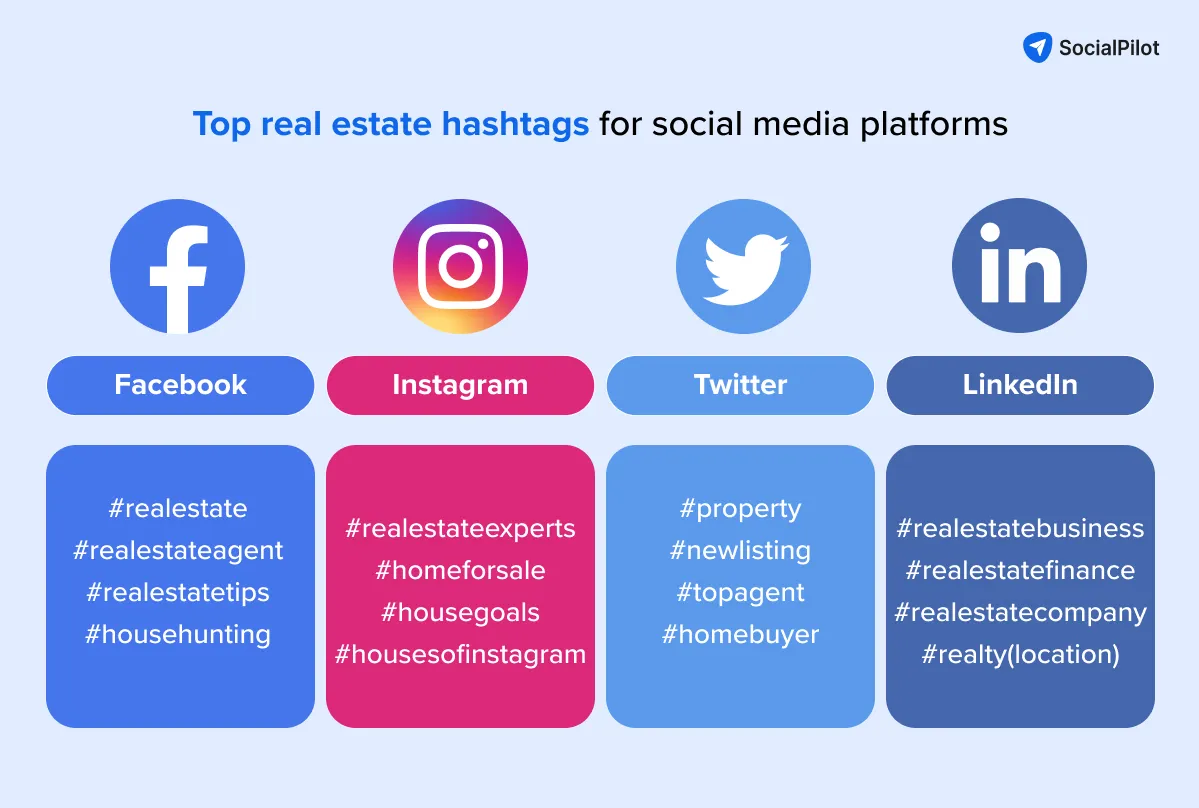
Whew!
That seemed like a lot to get done to get your real estate social media marketing on track. If you are feeling overwhelmed, take a deep breath. You don’t have to do it all single-handedly.
6 Real Estate Social Media Marketing Tools
There are numerous tools available to solve all your problems and get everything effortlessly done. Here are some relevant real estate social media marketing tools:
1. SocialPilot: Optimize Real Estate Social Media
SocialPilot, a comprehensive social media management tool, is designed to propel your real estate social media marketing to new heights.
But how does it achieve this?
By offering an array of features such as sophisticated scheduling and publishing capabilities, seamless team collaboration, in-depth analytics, and a streamlined Social Inbox for instant communication with your audience.
Today, SocialPilot is the favored choice for real estate agencies with a presence across multiple platforms and marketing teams managing diverse property portfolios.
Let’s explore the key features that position SocialPilot as a leading tool in the realm of real estate social media management:
- Scheduling and Publishing: This feature allows you to schedule and publish your social media content across all major social networks, extending your real estate reach and potentially attracting new clients. The advanced post scheduler provides customization options for each platform, allowing you to incorporate photos, videos, emojis, GIFs, mentions, custom fields, and hashtags for a more personalized touch.
- Analytics: SocialPilot delivers a comprehensive overview of your social media account’s performance, empowering you to analyze and make necessary adjustments. Understand which posts perform best and gain the ability to repost right from the dashboard or generate detailed reports for your team or clients.
- Social Inbox: This tool integrates a simple yet effective Social Inbox, promoting real-time engagement with your social media audience. Ensure no lead or feedback slips through the cracks by promptly responding to all comments, reviews, and messages.
- Collaboration: SocialPilot boosts your team’s efficiency by enabling you to invite team members and clients to collaborate on specific accounts. Streamline your workflow and align visions with the help of comments on posts and an approval workflow.
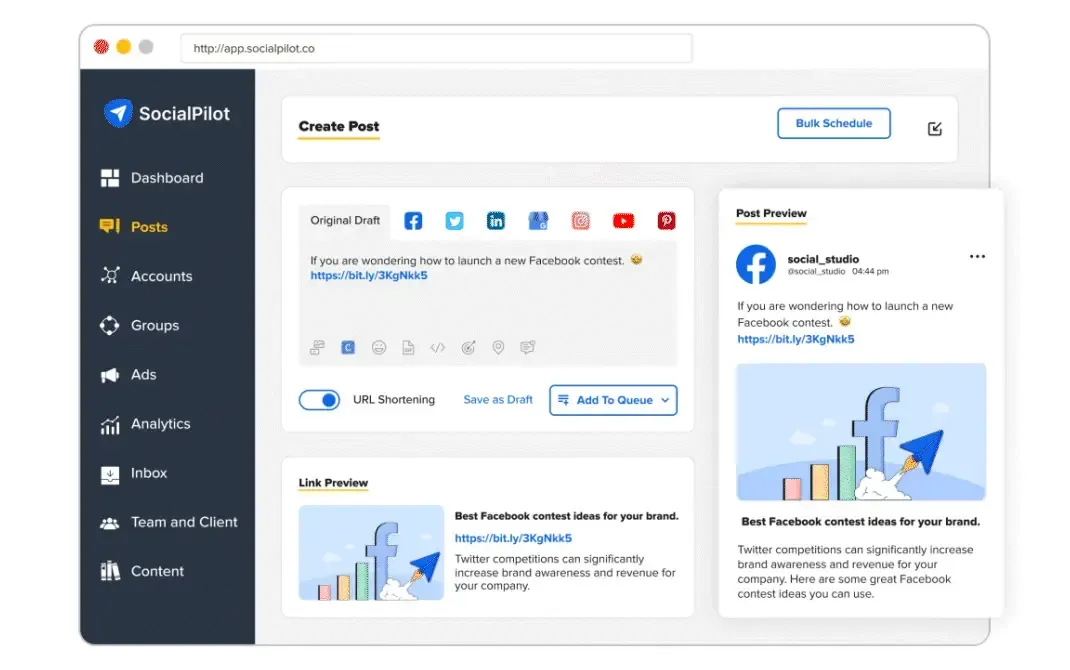
2. Canva: Design Eye-Catching Property Visuals
A game-changer in the design world, Canva is a must-have for creating and designing social media posts. The tool offers a user-friendly interface with a vast selection of pre-designed layouts making designing aesthetic content a breeze even for non-designers.
3. ChatGPT: Boost Engagement with AI Conversations
The current global sensation that has changed how content creation works forever, ChatGPT is an open-source AI writing assistant. Marketers can use this tech masterpiece to generate creative and humane social media posts and ad copies of any other long-form text content they need.
4. Animoto: Create Engaging Real Estate Videos
Animoto is an online video creation app that allows users to create professional-looking videos. The platform provides a drag-and-drop editor where you can use your visuals or take from the tool’s vast library of samples and templates to ease and customize the creation process.
5. GIMP: Enhance Property Images Professionally
GIMP, short for GNU Image Manipulation Program, is a free, open-source graphics editor popular for image editing and creation. It offers features such as photo enhancement, color correction, and cropping, facilitating professional-grade image edits.
Conclusion
That wraps up our guide to getting started with real estate social media marketing.
We have tried to give you some insight into how important it is to build your presence on social media. It can open doors for you, boosting your reach immensely and giving you tools to target your audience efficiently.
Whether it’s connecting with potential buyers or featuring property listings, social media platforms offer a versatile stage for your real estate business to flourish.
And to make your work easier, there are always tools like SocialPilot, ready to wield automation and get the job done with minimum effort.
It’s time to take your real estate game to new heights and conquer the digital landscape!





